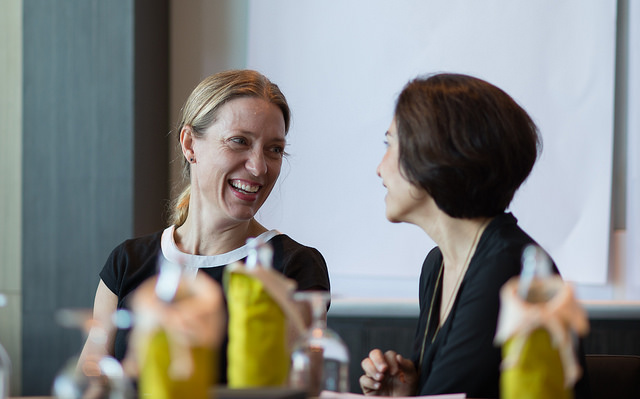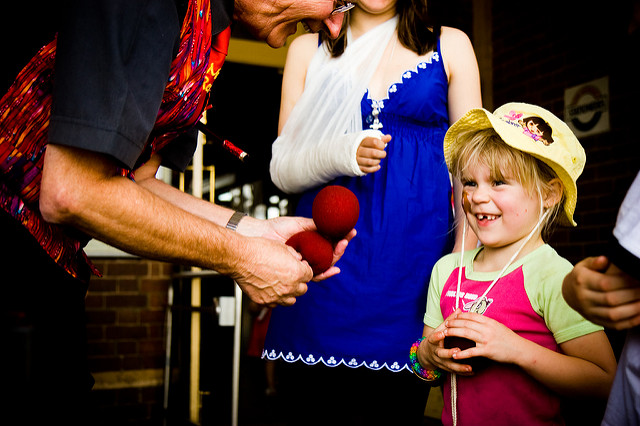Unlock the Magic in Your Story Now
Get the Free 20 questions to Ask Before Launching Your Idea workbook when you sign up for occasional updates.
Get the Free 20 questions to Ask Before Launching Your Idea workbook when you sign up for occasional updates.
Gaining The Advantage
filed in Storytelling, Strategy, Success
 This week you answered a customer query and solved her problem. You responded to every email, tweaked your resume and made your case well in the last meeting. You ticked off the things on your to-do list, had a look at your numbers and made solid plans for the weeks ahead. And that’s exactly what your competitors did too.
This week you answered a customer query and solved her problem. You responded to every email, tweaked your resume and made your case well in the last meeting. You ticked off the things on your to-do list, had a look at your numbers and made solid plans for the weeks ahead. And that’s exactly what your competitors did too.
We spend a lot of our time doing the busy work of trying to gain an advantage in an attempt to compete and win. It turns out that the most sustainable path to significance is to do the things that the competition would never dream of doing—the things that only you would do.
You don’t need to compete when you know who you are.
Image by chat des Balkans
Share this article
By How Much?
 Our financial advisor, who lives in another state, almost 3,000km away, stayed for dinner after our annual appointment last night. Sarah spent time catching up with our boys, chatting to them about their plans for summer and beyond. We exchanged dessert recipes and movie recommendations. Of course, Sarah could have spent those three hours on more measurable or scalable business building tactics. The things that provide her with an immediate metric or result—proof that she’s making progress or doing a good job.
Our financial advisor, who lives in another state, almost 3,000km away, stayed for dinner after our annual appointment last night. Sarah spent time catching up with our boys, chatting to them about their plans for summer and beyond. We exchanged dessert recipes and movie recommendations. Of course, Sarah could have spent those three hours on more measurable or scalable business building tactics. The things that provide her with an immediate metric or result—proof that she’s making progress or doing a good job.
Every new client Sarah chooses to work with comes to her by word of mouth. She’s recommended because of her warmth and humanity, not just because of the measurable outcomes she delivers for clients.
Our best work is often the thing that’s not replicable, scalable or measurable. That’s why it’s our best work.
Image by Sebastian Sikora
Share this article
A List Of Alternatives To Winning
filed in Marketing, Storytelling, Strategy

Alternatives To Winning
- Caring
- Helping
- Being human
- Growing wiser
- Inspiring others
- Righting wrongs
- Upholding values
- Giving generously
- Learning patience
- Prioritising values
- Practicing empathy
- Building community
- Leading thoughtfully
- Acting with integrity
- Exploring possibilities
- Encouraging progress
- Making a contribution
- Teaching perseverance
- Fostering collaboration
- Experiencing fulfilment
- Working towards mastery
- Changing how people feel
- Questioning the status quo
- Putting people before profits
- Creating the future you want to see
- Doing work you’re proud to have done
It turns out there are more ways to matter than just winning. We get to choose which boxes to tick.
Image by Odwalker
Share this article
One Or All?
filed in Marketing, Storytelling
 The blackboard on the pavement outside the florist reads; ‘Flowers for ALL.’
The blackboard on the pavement outside the florist reads; ‘Flowers for ALL.’
It’s a busy spot with plenty of foot traffic, behind a tram stop, a few doors down from the hospital. Maybe that’s why they’re marketing to everyone, instead of trying to resonate with someone. The marketing speaks to passers-by. But it doesn’t consider why they’re passing by, where they’re going, at what time, on which day. The message doesn’t invite the prospective customer to see how the act of buying flowers could change their day or even their week.
What would happen if the florist altered the message on the blackboard every day or even three times a day? There’s no doubt Monday morning’s marketing would be different from Friday afternoon’s. Perhaps, inspiring the office worker to brighten her desk for the week, or inviting the tired junior doctor to get his weekend off to a good start by surprising his partner.
As marketers, we have two choices, we can say something for the sake of saying something, or we can say the thing that will change something.
What would you write on your blackboard?
Image by Florian Lehmuth
Share this article
Important
filed in Marketing, Storytelling, Strategy
 It isn’t just your mind that responds when you get an email with the subject line ‘urgent’ or ‘important’. Your heartbeat increases, your muscles tense and your breathing gets faster. You feel bad. Your day is thrown off course, if only for a moment. We hate these emails and resent people who fail to communicate with empathy. And yet our marketing is designed to create urgency. An online search for ‘how to create a sense of urgency’ yields 34 million results. In a commercial world, there is an appetite for knowing how to raise alarm.
It isn’t just your mind that responds when you get an email with the subject line ‘urgent’ or ‘important’. Your heartbeat increases, your muscles tense and your breathing gets faster. You feel bad. Your day is thrown off course, if only for a moment. We hate these emails and resent people who fail to communicate with empathy. And yet our marketing is designed to create urgency. An online search for ‘how to create a sense of urgency’ yields 34 million results. In a commercial world, there is an appetite for knowing how to raise alarm.
How you convince and communicate, is just as important as the way your products are made or your services delivered. The measure of your company isn’t only your conversion rate, profit margin or some other conventional way of keeping score. The measure is how it felt to cross your path. Your goal is to be as proud of the way you’re building, as you are of what you’re building.
Share this article
Knowing What You Don’t Know
filed in Marketing, Storytelling, Strategy
 The most unhelpful assumption we make as marketers is that our customers know why they need our products or services. From there we think our job is to offer proof—to tell people why we are the best alternative. The first rule of innovation, sales and marketing is to understand the customer’s pain points (often before the customer knows them) and then to show her what life will be like in the presence of your product.
The most unhelpful assumption we make as marketers is that our customers know why they need our products or services. From there we think our job is to offer proof—to tell people why we are the best alternative. The first rule of innovation, sales and marketing is to understand the customer’s pain points (often before the customer knows them) and then to show her what life will be like in the presence of your product.
Your success is often determined by knowing what you don’t know about your customers, and by being aware of what they don’t grasp about their problems. Double down on understanding before offering proof.
Image by UN Women
Share this article
What’s Beyond Reach?
 When U2 perform a stadium concert, their reach is the entire audience of 60,000 eager fans. As he sings the first note, Bono understands his job is to create an emotional connection with every member of the audience. If the concert goer isn’t changed by the experience, then she might as well have stayed at home and listened to the album on her iPod.
When U2 perform a stadium concert, their reach is the entire audience of 60,000 eager fans. As he sings the first note, Bono understands his job is to create an emotional connection with every member of the audience. If the concert goer isn’t changed by the experience, then she might as well have stayed at home and listened to the album on her iPod.
In a commercial world, we spend the majority of our time trying to reach people—often measuring our success by counting the numbers of people who receive our fliers, browse our products or view our pages. It’s easy to lose sight of the fact that ‘reach’ is never the end goal. It’s simply the starting point on the road to delivering value and creating an impact.
What’s the real marker of your influence or progress?
Are you investing resources in the things you want to change?
Image by U2 Start
Share this article
The Forgotten Marketer
 The best marketer I ever knew was a magician. Literally. John Knight was legendary, and not just amongst children. His act was the highlight of birthday parties and community events. He could keep a group of sugar high children transfixed. But he also knew a big part of his job wasn’t the magic tricks—it was his ability to reassure and take pressure off frazzled parents come party day.
The best marketer I ever knew was a magician. Literally. John Knight was legendary, and not just amongst children. His act was the highlight of birthday parties and community events. He could keep a group of sugar high children transfixed. But he also knew a big part of his job wasn’t the magic tricks—it was his ability to reassure and take pressure off frazzled parents come party day.
John Knight’s magic tricks varied very little, and that didn’t matter. His real magic was empathy for his paying customer. Everything he did, from confirming the booking, to turning up early and herding kids to the table to sing happy birthday, said; ‘I see you,’ to his customer. The skill was in how he did it. The way he showed up—his way.
Of course, at the end of the party, John had six more bookings. No advertising required. His work was his message. In a world where we’ve become obsessed with followers and followings, likes and shares, simply doing a great job is underrated. Your work can be your message.
Image by Oliver Gouldthorpe
Share this article
Perfect Ten
 When we think of our work or products and services, we imagine the perfect ten version of them. The days without a wrinkle, when we are in the zone, and everything is running like clockwork.
When we think of our work or products and services, we imagine the perfect ten version of them. The days without a wrinkle, when we are in the zone, and everything is running like clockwork.
Striving for ten while knowing it’s rarely achievable is not easy. The ability to live that paradox is how we make progress and create change—by the millimetre. Showing up to do our best, even when we wish it were better.
Image by Andrea Passoni
 Not so long ago conversations with strangers just happened anywhere and everywhere. This was especially true in Dublin where I grew up. It was not unusual for someone you’d never met to practically tell you their life story while you were standing waiting for the 16A bus into the city. Showing an interest in other people, or being what some people might call, ‘nosy’ was part of our Irish DNA. That’s certainly changed the world over.
Not so long ago conversations with strangers just happened anywhere and everywhere. This was especially true in Dublin where I grew up. It was not unusual for someone you’d never met to practically tell you their life story while you were standing waiting for the 16A bus into the city. Showing an interest in other people, or being what some people might call, ‘nosy’ was part of our Irish DNA. That’s certainly changed the world over.